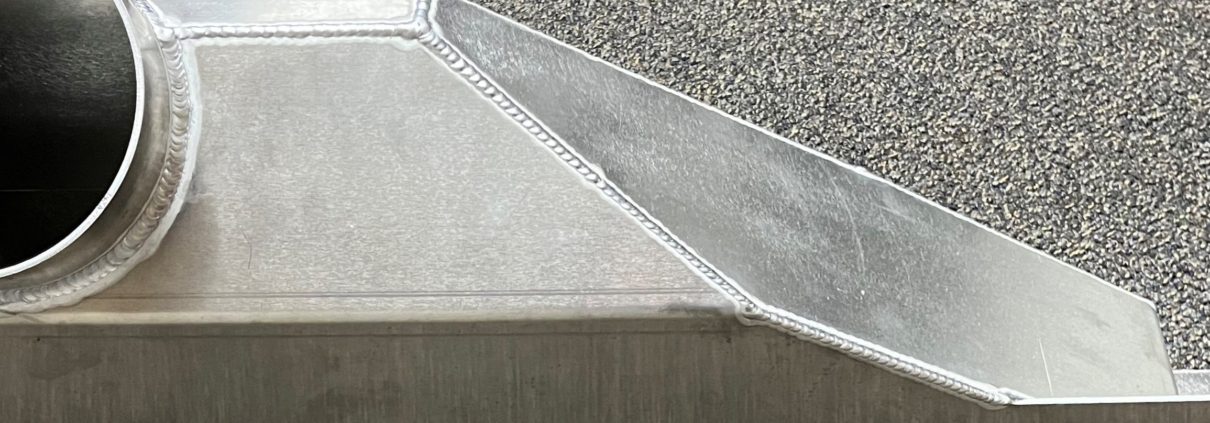Consider these important factors to ensure your next metal fabrication supplier can make the cut
The demand for aluminum in metal fabrication is on the rise. Specified for its favorable properties — light weight, strength, corrosion resistance, non-sparking and non-magnetic — aluminum has become a popular alternative to stainless steel in a variety of applications, such as electrical, truck components, appliances, agricultural equipment and automotive. Aluminum is also being specified as an alternative to steel products that require a secondary process to prevent rusting, such as painting or plating.
As a metal fabrication supplier to tier one manufacturers, STAUB Manufacturing has fully integrated aluminum into our solution portfolio. In fact, we’re currently working on more aluminum projects than steel or stainless steel.
But from a fabrication standpoint, aluminum presents a unique set of challenges. Not all suppliers have the capabilities, tooling, processes and skills needed to produce quality aluminum parts. Although many shops claim to be setup to handle aluminum, few can back it up and see a project through to its completion.
Before you select a supplier for your next aluminum manufacturing project, first be sure they have what it takes to deal with aluminum’s unique manufacturing challenges. Consider the following factors to ensure your next metal fabrication supplier can make the cut.
Welding and/or forming is not for the inexperienced
If a fab shop is used to working only with steel or stainless steel, they’ll soon discover that aluminum is a whole different animal. First, aluminum is a softer metal than steel and is more prone to damage during the welding process. Since aluminum has a high thermal conductivity, it’s more susceptible to hydrogen absorption, which can result in bubbles and joint porosity — aka an imperfect metal formation.
Welders must understand these challenges and have developed the skillset needed to achieve a high-quality aluminum weld. A fab shop must also have the capabilities to properly grind down welds to achieve a finished and/or polished product. Unfortunately, it’s all too common for manufacturers to suffer production setbacks from receiving poorly welded or unfinished products.
Aluminum laser cutting — caveats and considerations
With jobs that require precision metal fabrication techniques, laser cutting is typically the best option. However, laser cutting of aluminum requires a higher attention to detail. Although laser cutting ensures greater degrees of accuracy and consistency in a final product, aluminum takes longer to cut than steel and has lower limits of material thickness.
Once laser cutting is complete, fabricators will find that aluminum requires extra effort to clean up and remove burrs. Without the proper grinding and deburring tools, many fab shops simply can’t properly finish off aluminum parts.
Integrating finishing into the larger manufacturing process is the best way to handle these challenges. This way, as aluminum parts come off a laser cutter, they’re automatically sent through a purpose-built deburring and finishing process.
At the end of the day, if you’re working with a fabricator who’s inexperienced with laser cutting of aluminum, you could end up with parts that 1) have a heavy burr, 2) are out of tolerance, or 3) leave you with an extensive amount of hand work to make them function correctly.
We’re built for aluminum fabrication
At STAUB Manufacturing, we’ve built the welding skills, laser cutting and finishing capabilities into our aluminum fabrication portfolio. Our expert welders are equipped with the tools and training to ensure the highest quality aluminum weld formations. In addition, our laser cutting machines and finishing processes are optimized for the rigors and challenges of aluminum fabrication.
Through the years, as we’ve continued to accept the difficult aluminum jobs that other metal fabricators have turned down, we’ve continued to hone our aluminum capabilities. Today, more than half of our contracts deal with the production of aluminum parts.
To lean more about our aluminum fabrication capabilities — or take an onsite tour of our facilities — please contact a member of our sales team. We’re ready to take on the difficult projects that other suppliers have passed over.




